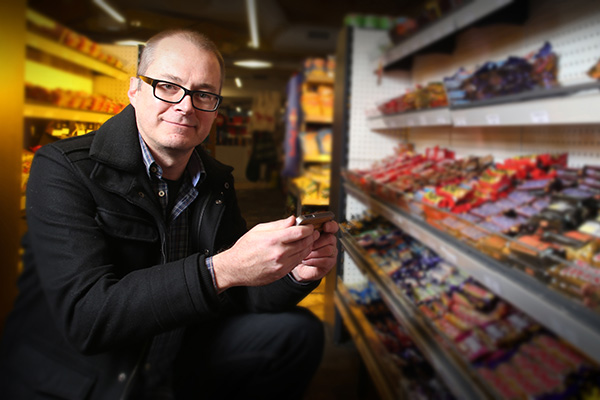July 21, 2014
Brain training app helps you quit smoking and resist junk food
A new brain-training app that helps you quit smoking and resist junk food is under development at UOW.
The interactive gaming app NoGo, which is currently being trialled in adolescents and adults in the Illawarra, is the brainchild of UOW psychologist Associate Professor Stuart Johnstone.
Professor Johnstone has spent the last eight years researching neurocognitive training techniques to help improve behaviour in children. NoGo, which uses brain training to help people make healthier food choices, is inspired by the success of an earlier program designed to improve the behaviour of children with attention deficit hyperactivity disorder without the use of drugs.
“This training approach gets users to exercise their restraint ‘muscles’ in the context of unhealthy lifestyle choices, with the aim of strengthening the muscles and improving behaviour,” Professor Johnstone said.
Professor Johnstone said the software involves a game that exercises inhibitory control and if used for 10 minutes each day, users could start to see results after 7-10 days.
In the game, users are rapidly presented with images that fall into two categories – unhealthy foods such as chips, chocolate and takeaway foods, and healthy foods such as fruit and vegetables. When they see healthy foods, users are asked to tap the screen very quickly, but withhold from tapping when they see unhealthy images.
“Studies from our lab and others have shown that this type of training, which is targeted towards a specific behaviour such as drinking alcohol or eating too much chocolate, can lead to reduced consumption.”
“There is good potential for this approach to be part of multimodal treatments for adolescent and adult obesity,” Professor Johnstone said.
Professor Johnstone said he hopes the app can also be adapted to help people quit smoking, which is the largest preventable cause of death and disease in Australia, accounting for more than 50 deaths each day.
“This approach could easily be adapted to help people quit smoking, as part of a treatment program, and we intend to examine that application in the future.”
“The relatively recent discovery that the brain is not hardwired, but is in fact ever changing and plastic, opens up a world of possibilities in terms of interventions that target cognitive processes,” Professor Johnstone said.
Media contact: Elise Pitt, Media & PR Officer, +61 4221 3079, +61 422 959 953, epitt@uow.edu.au.
